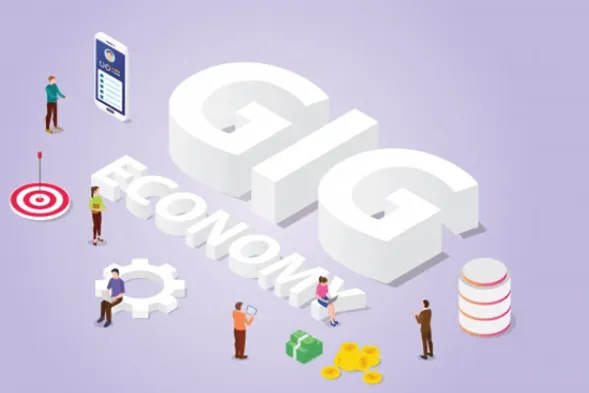The curro economy presented in its beginnings a series of promises that did not materialize, however it can have a resurgence, and BlockChain technology, DeFI and Cryptocurrencies can contribute a lot to this new beginning.

Hello leofinance friends, I hope you are all very well, surely in the course of the last few years you have heard, or have been part of the Gig economy, and although it was a revolution in the world of work, not everything turned out as well as expected, in fact, some propose that the Gig economy caused more harm than good in the long run, however, this can be redeemed, and blockchain technology could be a fundamental tool in that redemption.
But before we explain why, let's cover a bit of the basics.
What is the gig economy?
The gig economy is this new way of hiring services by contract or on a temporary basis through mobile applications, applications such as Uber, Airbnb, Fiverr, taskrabbit etc etc... are part of the gig economy, in these you can hire a specific service, such as bringing a driver, only for a specific occasion without complications of any kind, work done, work paid and presto. For those who provide the service, it is enough to register on the platform, meet the requirements, and soon you can get occasional jobs in the schedule that seems most convenient, for example, a student who has a motorcycle can use his free time working in Uber Eats, delivering meals at home without the commitment or the requirements of a formal job.
Customers, service providers, and companies are all part of the gig economy.
For context, in the United States and Mexico, for example, more than 30 percent of the workforce is involved in some way in the gig economy, and demand is on the rise. in Latin America, the gig economy is expected to be worth $335 billion by 2025. In the United States, the gig economy has 55 million participants and 33 percent of the country's companies use the gig economy in one way or another to obtain labor.
But this is not all it's cracked up to be.
The economy was a revolution in the labor market, and as is often the case with revolutions, some win and others lose, although it created many new jobs for people who had no opportunities in the traditional labor market, while supplying the demand for many services that although they were necessary did not have an adequate commercial structure to cover the entire market, the gig economy also undermined the job stability of many others, a classic example of this is how Uber has caused a considerable drop in the profits of cab drivers worldwide. Of course, there are cases like New York, where it is understandable and even fair that this happened due to the excessive costs of cabs product of a deeply unfair system.
https://documentedny.com/2021/11/23/taxi-cab-medallion-explained/
Another point to take into account is that for those who take the Gigs, labor flexibility and good income never materialize, some reports indicate that many of those who work in these jobs end up investing many more hours in them than a formal worker, up to 70 in a week, all this to obtain earnings that are only enough to subsist, basically they work to be able to continue working.
As the Gig economy has reached almost any type of service, this has changed the labor dynamics, today you can even hire temporary CEOs for an App in some countries, this means that the labor supply has increased, and therefore those who hire will always resort to the one who charges less, which has led to the disappearance of many formal jobs and the reduction of workers' earnings in general, weakening unions and making us go backwards in terms of labor rights, since these Gig platforms, nor those who hire the services provided by them, ensure the health or social security of workers, no pensions, paid sick leave, no dental insurance...
Large companies can save up to 30 percent of the cost of labor with the Gig economy.
An excellent video on what went wrong with the gig economy is this one from the Wisecrack channel

other common problems associated with gig platforms would be late payments, and the possibility that your contract could be terminated without right of withdrawal and without notice.
Changing the dynamic with blockchain.
If we analyze one of the main problems of Gig platforms is transparency, whether in contracts, whether in commissions, whether in the process of assigning jobs etc... if the platform is a blockchain algorithm, all information related to contracts and exchanges would be visible to all, without compromising the personal information of customers or service providers. This would facilitate labor relations and make the quotation of a service much more specific, allowing smart contracts in real time.
Another important point is the commissions, by relying on banks the commissions on these platforms are usually much higher than the exchanges on cryptocurrency platforms, in addition, in a blockchain algorithm the money can be tracked in real time and payments can be almost instantaneous.
If you watched the previous video until the end you will know that one of the possible causes of the resurgence of the gig economy are the platforms of joint ownership distributed among the service providers, this guarantees the economic stability of the same and increases the profits of those involved, well, in a blockchain platform the property would be much easier to distribute, trade, regulate, or liquidate, offering a level of control over it that users would never have with traditional contracts, also if external investment is necessary they can place parts of the company in an Exchange and get quick investment. Skipping a lot of intermediaries and obstacles that the market usually puts.
Although it is not mandatory that the platform operates with its own cryptocurrency, or with one of the thousands of cryptocurrencies that exist, the fact that it does so is a logical step, the possibility of switching between digital currencies not only ensures adaptability, but also that the service can be provided anywhere in the world without having to adapt the platform to a specific currency.
These are just some of the benefits that blockchain technology can bring to the Gig economy, I am sure there are others, in turn, linking cryptocurrencies with the trade of tangible goods and services would help a lot to clean up the image of this wonderful technology that has been much attacked in recent times.
Referencia Bibliográfica Consultada
[1] ECONOMY
[2] ECONOMY